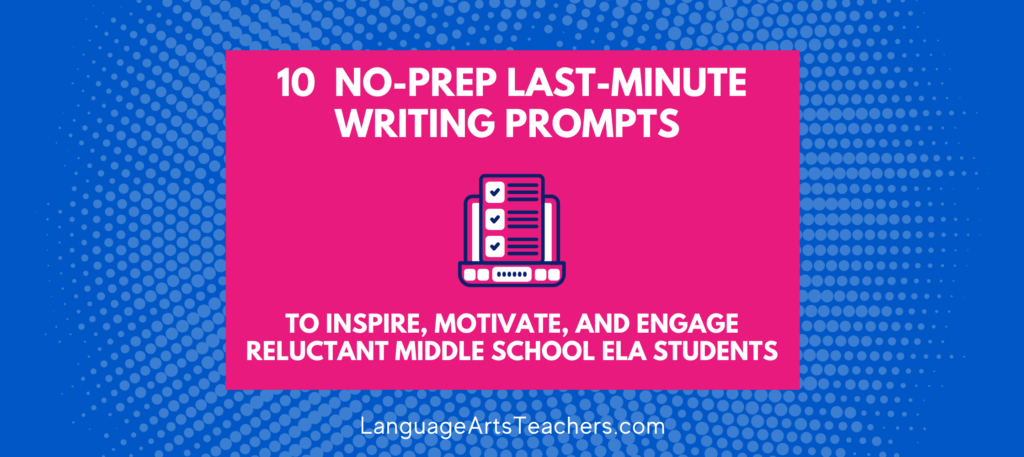Essay Grading Hacks
Top 3 Ways to Get it Done FAST!
Wow! Grading essays!
Ugh…
Holy cow. Middle School English / Language Arts teachers could drown in essays every weekend if it weren’t for a change in mindset on what grading essays can and should look like.
First of all, it totally goes against my whole “live life first, then teach” philosophy. Now I’m not saying you should live it up every day and go to work and not do well with your students and slack off and practically run over those kids as you rush out the door ahead of them each afternoon.
What I mean is that teachers work hard each day.
Oh so hard.
And on top of going above and beyond like we do, the last thing we should be doing is taking home stacks of essays each week and spending our weekends grading them.
We don’t need to do that⬆️
There are easier ways to provide targeted feedback to your students that is actually much more meaningful and relevant for them and for you. Do this by only grading specific parts of the students’ essays.
Oh, yes. I said it, and I’m sharing with you the top 3 ways I survived grading essays the last 15+ years, and it has worked beautifully in every grade level I’ve taught, from AP English IV down to 6th grade Language Arts (and every grade in between).
You’re not going to grade the entire essay for every student every time they write! That right three is the summary of my essay grading hacks!
Let’s dive in and look at the 3 top essay grading hacks that every English / Language Arts middle school teacher should know about and implement.
I’ll also provide solid, legitimate explanations for each of the essay grading hacks that you can use in case anyone questions what you’re doing. I will tell you that in over 15 years of teaching writing to students in grades 6 – 12, not once has a parent or administrator or student questioned me on this once I’ve explained what I’m doing and why. But just in case someone does, I’ve got you covered!
Essay Grading Hack #1
Grade Selectively
What it means to grade selectively is to think about out the main purpose for why you assigned the essay in the first place and then only grade that one thing. Yes, just one thing! Talk about essay grading hacks!
In other words, did you assign the essay because you’ve been teaching the research writing process and you’ve spent a lot of time working with your students on citing their sources in-text?
If so, then only grade the use of their in-text sources in those particular essays. Skim each essay to see that your students have paragraph organization and topic sentences, but otherwise, only focus on the in-text citations.
You can also tell your students ahead of time, like on the day they’re doing their revising or editing (after they’ve already written most of the essay) that the focus of their grade will be on the correct use of citations throughout their research paper.
You could even have them hi-light those specific parts of the essay right before they turn them in so it’s even easier for you to spot them and grade them.
The same thing works if you’ve assigned a literary response essay over a piece of fiction your students have read. Think about what the main focus of that essay was. Did you spend most of your teaching time on guiding students to write insightful commentary about the quotes and text evidence they used? Then have them hi-light their text evidence and the commentary they wrote for each quote and focus your grading on that!
Or did you focus on students writing introductions with clear thesis statements and concluding paragraphs that really bring the whole essay full circle? Then have your students hi-light the thesis statement, hi-light each paragraph’s topic sentence, and then mark the re-stated thesis and then you just grade those!
Essay Grading Hack #2
Grade Holistically Using Simple Rubrics
During my AP English teaching days at the high school level, I learned in more than one training session that professional AP graders spend no more than 60 seconds per essay. Think about what that means for essay grading hacks! Instead of criticizing every. little. thing. in an essay, they scan each one for the basic gist and for an overall competency as related to the prompt.
Let’s do the same. In fact, if anyone ever doubts you on this, here’s your justification. You can say to any parent or to any administrator that “Yes, I grade quickly and holistically because I am only checking for student success in one or two particular areas relevant to what I just taught this week. Professional AP graders for high school only spend about 60 seconds per essay because they know exactly which aspect of the writing process to look for. That’s the strategy I’m using in my own classroom in order to make sure I’m teaching and grading to the highest standard.”
Right? That’s awesome!
So set up and use a super-basic rubric for yourself and for your students. Yes, yes, there are so many standards that teachers must teach related to writing– everything from the use of the best text evidence to support understanding right down to the correct use of a semicolon.
But that doesn’t mean that an English / Language Arts teacher has to subject herself or himself to an achy back and tight hamstrings from sitting on the couch all weekend trying to assess all those things.
So once you know exactly what aspect of the writing process you’re going to focus on (as discussed in Essay Grading Hacks #1), just create a very basic, simple, easy-to-understand rubric.
An easy way to do that is to set up a grid-type chart and number it 4 through 1. 4 can represent a 90 – 100. 3 could be 80 – 89. 2 could be 70 – 79, and 1 could be 60 – 69. Do you need to go lower than that? It’s up to you. Maybe you work in a district that doesn’t allow anything below a 50, or perhaps you feel that if the student attempted something in writing, then you wouldn’t go lower than a certain score. It doesn’t really matter, though, because the point is that you set up a basic, easy way to grade.
You can then determine which 1 or 2 main items you’ll focus on for each category. Keep it simple and don’t spend a ton of time on it. In fact, draw a huge 4 x 4 grid on the board, set the grade representation for each number (4 through 1) and then get feedback from your students about what should represent each score. So if you know your main focus of the week was on the ability and skills to use varied sentence structures and to make sure the supporting details coincide with the main idea of the essay, then tell students.
Talk with them as a class about those elements you will be grading in the essay and have them talk to you about what exactly that looks like for each number in that grid. Jot it down on the board as they talk to you or have a students volunteer write it down for you all.
Snap a photo with your phone, let the students do the same, and there you go– you just created a student-centered rubric specific to the week’s lesson and you didn’t even have to type it up! Nice!
Essay Grading Hack #3
Don’t Actually Grade Every. Single. Essay.
But then the students won’t write if they know I won’t grade them all.
That’s just it! You can change this up soooo many ways that your level of creativity is the only thing you may have to watch out for!
Here are just a few things you could do. Once you read through this list, you’ll see what I’m saying and you’ll be able to create so many other scenarios yourself!
You know you need your students writing as much as possible. You also know that there are a plethora of writing assignments, both formal and informal and everything in between. When it comes to formal essays and papers and such, even with all the essay grading hacks mentioned previously, you still can’t be subjecting yourself to a hundred essays every weekend, even if you are spending 60 seconds or less on each one!
Here’s what to do:
Let’s say your class is writing up a storm! Way to go!
Perhaps your classes wrote three essays in the last two weeks. What the heck do you do with all that?
Well, again, here are some ideas to remove the stress from your shoulders:
-
Not every essay has to be a formal, finished essay in which your students went through the entire, tedious writing process. So have them totally complete some essays and not complete others. Again, if you’re only focusing on topic sentences and supporting text evidence, then maybe you just have them write the body paragraphs of what would be or could be a formal essay. On the day they’ll turn that in, have your students choose the one paragraph they think they did the best on, circle it, and you’ll just skim that one paragraph and assign a holistic grade. DONE!
-
What if students wrote like three essays the last two weeks and you’ve been putting off having them turn them in because it’s soooo overwhelming to think about grading them…? Right? So have students staple those three papers in the order they think is best, with their best essay on top and the next best following that one and the “worst” one on the bottom. Then choose one of the grading hacks from Essay Grading Hack #1 and you’ll just check the top essay for that one element while kind of ignoring the rest. For students who only wrote one of the three essays for whatever reason, you’ll decide what to do about that. Perhaps it’s a natural consequence for that students to not get to pick the best one, but instead to be stuck with the only one he or she wrote. Perhaps you decide that the one essay you’ll grade will represent 80% of the essay grade and that as long as students turn in the other two also, those will automatically get 20% of the grade… Either way, DONE!
-
A third essay grading hacks option here is to consider that you probably teach several classes of the same subject throughout the day. So if your students have written several essays over the past couple of weeks, simply tell your first class of the day that they will turn in the essay on this particular topic. Your second class of the day will turn in another one. In other words, each class turns in a different essay, but they’re all basically from the same essay “pool”.
-
One last essay grading hacks option is to have students turn in all their recent essays, but have them hi-light one particular aspect of the learning that you really want to assess mastery. For instance, if you’ve been teaching thesis statements in depth the past two weeks, then have students turn in all their recent essays and just li-light the thesis statements in each one. Then all you have to do is skim each one to check the validity and legitimacy of those thesis statements. If students wrote four essays over the past three weeks and you need to get an essay grade in the grade book, then label it in the grade book as “Thesis Statements in Essays” and score those bad boys together and your DONE!



